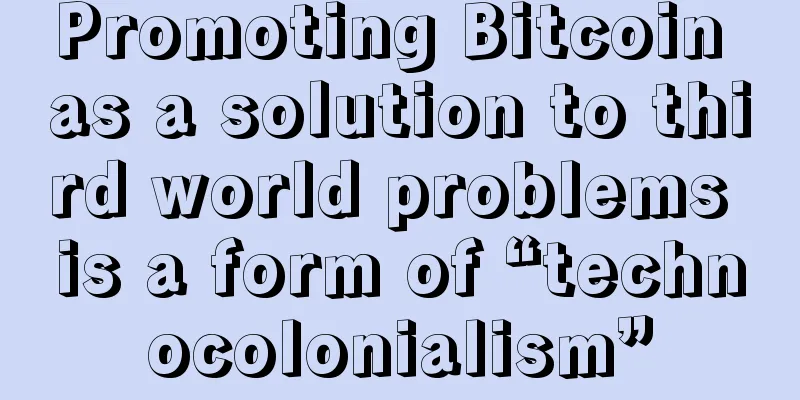Promoting Bitcoin as a solution to third world problems is a form of “technocolonialism”

|
Author: ManjiMasha A new United Nations working paper argues that the Bitcoin community has a tendency to "provide technological colonization" and "spread the gospel of technological libertarianism" and is attempting to make digital currency a solution to problems in developing countries. The document, authored by Brett Scott, an independent researcher and consultant at the United Nations Research Institute for Social Development, covers the basics of Bitcoin and explores the technology's potential applications in remittances, cooperative institutions and micro-insurance systems. He also identified potential “points of concern and conflict,” such as the tendency of the bitcoin community to tout “solutions” that are “above technology” and to promote libertarian political ideas. In contrast, the document considers blockchain 2.0 technology more as having a “more open communitarian approach” and the potential to create “massive collaboration.” Out of touch with “hard social realities” Scott said the foundation behind cryptocurrency is the collaborative open source principles and P2P networks that promise social solidarity and win-win results. But he cited Yalewitz and Wilson’s 2015 paper “Bitcoin User Characteristics”, saying that Bitcoin has become synonymous with “speculators, profit-seeking entrepreneurs, market fundamentalist libertarians and technology supremacists”. He said that although Bitcoin has been touted as a solution for the unbanked in developing countries, the feasibility of this claim remains to be verified because the use of digital currencies in some countries is limited by network services and infrastructure. Besides the problem of establishing trust in an unknown technology, using Bitcoin requires the constant availability of both the internet and electricity. Scott concluded that without understanding these issues, the Bitcoin community is “out of touch with the difficult social realities in many poor countries.” He added: “The frequent occurrence of offensive speech within the group and the inequality of access and wealth within the system seem at first glance to conflict with the idea of socially coordinated economic activity.” The Internet may not be a solution Scott also took the opportunity to make more political criticisms, saying that those who tout Bitcoin as a "life-saving currency" seem to be suggesting that "they are more interested in 'escaping the Internet' than seeking fundamental solutions to real grassroots problems in the country." Adoption of Bitcoin by “weak” countries is at best a short-term solution, he said, a move that “decomposes the state by strengthening already fragile institutions.” He continued: “In countries like the United States, using Bitcoin to fight against a strong banking conglomerate is one way, but in countries like Zimbabwe, they need to consolidate the banking system — which can only be achieved through a difficult and long political struggle.” The author further lists the rise of ideas such as “spreading the gospel of technological libertarianism” and “blockchain missionaries in developing countries expounding on the idea that technology is the savior and the market is the savior, while also spreading anti-state ideas.” Technology doesn’t operate in a vacuum, Scott said. Likewise, the Bitcoin system isn’t just about “attacking poor countries for all the rights.” Potential in some areas Finally, Scott acknowledged the potential use of Bitcoin and blockchain technology in certain areas. But he also warned: “The community involved in this technology is very enthusiastic and experimental, which is very easy to happen in the culture of elite, technology-centric startups with breakthrough technologies.” Looking ahead, he suggested further research into how this technology can address “the very real struggles that people in different cultures and political formations face in developing technology.” JPM compiled from Coindesk, UN Paper: Pushing Bitcoin for Third World Issues is 'Techno Colonialism', by Daniel Palmer. |
<<: Bitcoin mining company Butterfly Labs reaches settlement with FTC
>>: PayPal Blocks Bitcoin Parody of PayPal Super Bowl Ad
Recommend
What are the faces of men who are destined to be rich? They are born to be rich.
Everyone hopes to live a good life without having...
Tell you what to do if you have hanging needle lines
Hanging needle lines indicate bad luck with noble...
What are the faces that can be said without doubt?
What some people say is quite interesting. They m...
Are women with beards on their lips born to be unlucky? Are they more honest?
When talking about beards, everyone thinks of men...
Are women with moles in their children's palace very weak in character?
For some women, many people tend to label them as...
Uncover what kind of face a woman has a good fate
Whether a woman has a good destiny can also be se...
The mole on your eyebrow determines your success or failure in life
There are many moles on the eyebrows, but moles o...
On the left-handed celebrities in palmistry
Louis Napoleon Bonaparte French Emperor of the Th...
Which face type likes to grow flowers at home?
It is easier to accept that different people have...
What is the difference between dimples and vortices?
When we meet a stranger, we will get many impress...
What are the characteristics of the most blessed woman in physiognomy?
Whether a woman is blessed or not is very importa...
How to read the face and what does the hooked nose represent
People with hooked noses are usually more insidio...
What does a broken marriage line mean in palmistry?
Why are some marriages like a war without the smo...
Strong woman's face
I believe that we have seen many strong women in ...
What are the facial features of a smart woman? What does a girl who is destined to be a young lady look like?
The face contains information about all aspects of...









